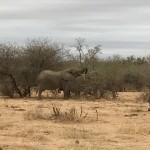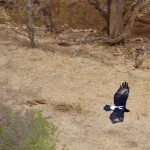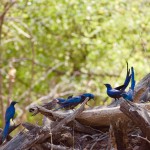 In October, I had the privilege of being one of over a thousand student and adult delegates at the Round Square International Conference in Cape Town, South Africa.
In October, I had the privilege of being one of over a thousand student and adult delegates at the Round Square International Conference in Cape Town, South Africa.
A significant take-away from that experience relates to H2O or water, something that we have in abundance here in Canada, but an important resource that we all largely take for granted.
This is not the case in Southern Africa. Any visitor to Cape Town is immediately made aware that there is a water crisis that has affected the region because of a severe drought for the past five years. This is a place where baths are no longer permitted (plugs have been removed from all tubs in hotels) and showers are now limited to a maximum of 2 minutes.
The city of Cape Town is taking many steps to manage the crisis, yet officials are not certain that they will work. It has adopted a scenario called “the new normal”, declaring the city a permanent drought region and mandating that every citizen change his/her relationship with water by simply consuming less. It has also unveiled a new Critical Water Shortage Disaster Plan in an attempt to avert an even more severe scenario in the future.
As it stands, Cape Town currently only has about 25% of the water that the city requires, and significant changes and reduction levels are being imposed on individuals, families, and institutions such as schools, universities and hospitals.
The city currently uses 618 million litres of water per day, and unless consumption is soon reduced to no more than 500 million litres/day, then the city’s water source could run dry before the end of March, only four months from now.
The municipality is limiting water consumption to 350 litres/day per household in certain cases and strict enforcement measures are being introduced, including fines and other consequences. One option being considered is extreme water pressure reduction across the whole city and to start rationing water with localized temporary shutdowns across different sectors of the city. More recycling of “grey water” will also be mandated. If the city slips into the “disaster stage” or “extreme disaster” stage, the city tap system would be turned off and people will only receive limited amounts of water at designated collection points, primarily for drinking.
Exposure to all of this made me reflect on our relationship to water here in Montreal. As Canadians, we have plenty of this increasingly precious resource. Yet that doesn’t mean we shouldn’t be preserving it more. Unfortunately, on a global scale, we are actually water gluttons. On average each Quebecer consumes about 400 litres of water per day. We are the second largest consumers of water per person in the world, and we consume twice as much as the average European. So, perhaps we should start a new relationship with water ourselves.
On our west coast, the city of Vancouver decided to focus on reducing water consumption over a decade ago and has experienced success (reduction of 20+%). Yet, it is Australia that leads the world in conservation practices. These examples reinforce that we can do better here.
This week, I asked all of our high school students to show greater affinity with Round Square schools in South Africa by trying a week of 2-minute showers. I hope this first step goes well and will lead to further conservation initiatives. – Christopher Shannon (Pre-U ’76), Headmaster

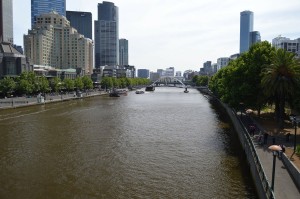 After school on October 26, I was really nervous because I was about to go rowing. The team needed a cox (the person who steers the boat, gives commands, and is usually small in stature), so I volunteered to do it. I decided to try it because rowing is THE sport to do, with training six times a week and so challenging that kids drop out every year. I thought it would be a great experience, plus I’d be navigating a boat through the famous Yarra River in the heart of Melbourne. I was also nervous because maybe I’d crash the boat!
After school on October 26, I was really nervous because I was about to go rowing. The team needed a cox (the person who steers the boat, gives commands, and is usually small in stature), so I volunteered to do it. I decided to try it because rowing is THE sport to do, with training six times a week and so challenging that kids drop out every year. I thought it would be a great experience, plus I’d be navigating a boat through the famous Yarra River in the heart of Melbourne. I was also nervous because maybe I’d crash the boat!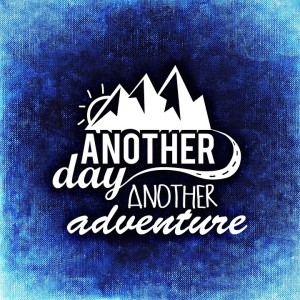 If there’s one thing we, as high school students, hear more than anything else, it’s the questions: So, where do you see yourself in a couple years? Or, What do you want to study when you graduate?
If there’s one thing we, as high school students, hear more than anything else, it’s the questions: So, where do you see yourself in a couple years? Or, What do you want to study when you graduate?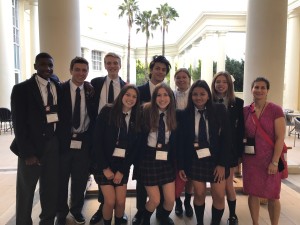
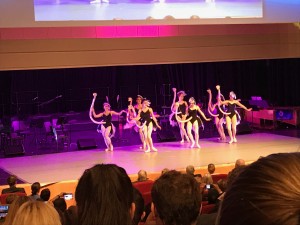 On the first morning of the Round Square Conference, we headed to the Cape Town International Convention Centre to take part in the Opening Ceremonies. Our delegation, along with many others from around the world, was very excited for the inauguration of the conference.
On the first morning of the Round Square Conference, we headed to the Cape Town International Convention Centre to take part in the Opening Ceremonies. Our delegation, along with many others from around the world, was very excited for the inauguration of the conference.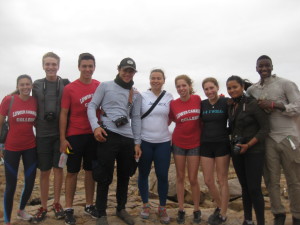 Once we returned to our camp, we left for the next one. On the drive, we saw a cheetah and a baby cheetah lying together, which was very cute. When we arrived, we saw baboons and a warthog walking by, completely unfazed that we were there. In the afternoon, we went on a game drive. We were so excited because we finally found elephants! After spotting many more animals, we went to the hyena den and found a couple of them lying outside. After watching them for a while, we went back to our camp, had dinner and went to sleep.
Once we returned to our camp, we left for the next one. On the drive, we saw a cheetah and a baby cheetah lying together, which was very cute. When we arrived, we saw baboons and a warthog walking by, completely unfazed that we were there. In the afternoon, we went on a game drive. We were so excited because we finally found elephants! After spotting many more animals, we went to the hyena den and found a couple of them lying outside. After watching them for a while, we went back to our camp, had dinner and went to sleep.